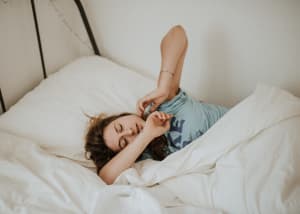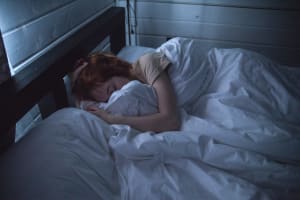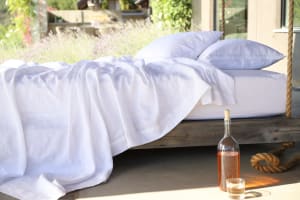You’ve probably heard the term “sleep cycles” or “Stages of Sleep” before. Maybe you’re familiar with the terms “REM” and “deep-sleep.” You’re probably also aware that a good night’s sleep revolves around a healthy sleep cycle.
But what exactly is it?
Stages of Sleep and the Sleep Cycle
As it turns out, when you turn off the lights, get in bed and conk out, your body and brain move through several different kinds of sleep. These different types of sleep, called stages, are each slightly different in their length and their characteristics.
The sleep cycle is the way your body moves through these different stages of sleep throughout the night. It is normal for healthy adults to move through the entire sleep cycle anywhere from three to five times during the course of an 8-hour sleep.
To understand sleep cycles or even your circadian rhythm, you need to first understand the different stages of sleep.
Scientists divide sleep into two basic categories: rapid eye movement (REM) sleep, and non-rapid eye movement (non-REM) sleep. As you drift off, your body prepares to enter the sleep cycle in the first stage.

Non-REM Sleep
These first stages of sleep are categorized as non-REM sleep. This period of the sleep cycle is divided into three separate stages.
- Stage 1: This first stage happens right after you fall asleep. During stage 1 non-REM, your sleep is very light, and you can be awakened easily. At this point, the brain produces high amplitude bursts of activity known as theta waves. You might experience some abrupt muscle spasms during this time, and even the infamous sensation of falling. This stage is the shortest of all the sleep stages, typically lasting about 10 minutes or less.
- Stage 2: After stage 1 non-REM, your body will fall into a deeper state of sleep marked by the muscles relaxing, decrease in heart rate, and a slight drop in body temperature. Your brain wave activity during this time will be characterized by bursts of very intense yet brief moments of activity. These bursts are known as “sleep spindles,” a reference to the way they look when measured on an EEG. This stage lasts anywhere from half an hour to an hour.
- Stage 3 / 4: The final stage of non-REM sleep, also called “deep sleep,” is when your body does much of the physical repairs for which sleep is so important. During this time, your body is busy regenerating tissue, building up bone and muscle, and improving the effectiveness of your immune system. Meanwhile, your brain is producing “slow-wave sleep,” or delta waves. These activities ensure that it is difficult to awaken someone from this sleep stage, which would result in disorientation lasting a few minutes. Typically stage 4 non-REM is simply a deeper version of stage 3 non-REM. The length of these stages differ dramatically based on age and other factors. Adults typically experience between 30 minutes to 2 hours of stage 3 and 4 non-REM sleep each night.
After moving through all of the non-REM sleep stages, you will move into REM sleep.
REM Sleep Stage
Rapid eye movement (REM) sleep is named for the characteristic eye movements which occur when one enters this stage. In addition to the eyes, twitching of the muscles may occur, while paralysis of voluntary function also sets in. It is during this time that intense dreaming occurs due to an increase in brain activity. While it is possible to dream in stages 3 and 4 of non-REM sleep, dreams occurring in REM sleep are usually much more vivid and intense. Read more in our guide to dreaming
REM sleep typically begins about 90 minutes after falling asleep, and lasts about 10 minutes during the first sleep cycle. Each subsequent REM period will be longer throughout the night, culminating in a final REM period of 1 hour in adult sleepers.

Changes in the Sleep Cycle
As we grow from infants to children, to teens, to adults, our bodies require different amounts of sleep. During the course of our lifetimes, this means that our sleep cycles will vary depending on our age, among other factors.
In general, it seems that the amount of REM sleep we get each night decreases as we get older. According to WebMD, babies can spend up to half of their sleeping time in the REM stage, while adults spend only up to 20% of their time there. Adults tend to spend less time in deep sleep stages as well, which is theorized to be related to many of the physical declines that accompany aging.
Abnormal Sleep Cycles
While we tend to cycle through the sleep stages in a predictable pattern, it is possible to move between non-consecutive stages depending on extenuating factors.
In addition to the natural shifts in our sleep cycles occurring with age, there are a number of other factors that can change the patterns of our sleep cycles.
- Sleep History: The amount and quality of recent sleeping can have a dramatic effect on how we move through our sleep cycles. For example, missing a night of sleep may mean that an individual spends more time in deep sleep and REM sleep the next time they go to bed.
- Alcohol Use: Falling asleep with alcohol in the bloodstream can make it difficult to enter REM sleep early on in the night, and cause awakenings during this time. The more you metabolize throughout the evening, the easier it becomes for the body to enter the REM stage, and spends more time there. Read our article on The Effects of Alcohol on Sleep
- Napping: Napping in the afternoon, which is common in many countries around the world, may make it more difficult to fall asleep at night. Additionally, if naps last longer than one hour, sleepers risk falling into deep sleep or REM sleep. If this happens it may become difficult for them to re-enter those states when they sleep again later in the evening. Scientists seem to agree, however, that napping is a good way for those who have trouble getting an adequate quantity and quality of sleep at night to make up for it during the day.


